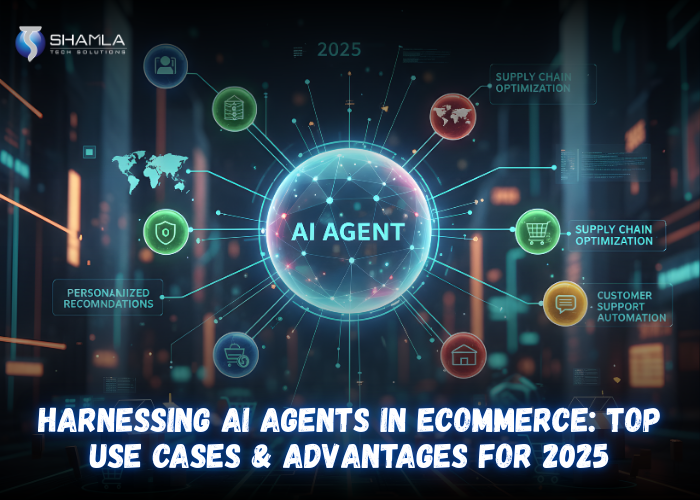What Are AI Agents in Ecommerce?
- Perception: Ingest and interpret real-time data, including customer interactions, pricing fluctuations, product metadata, and backend operational signals.
- Reasoning: Use LLMs, knowledge graphs, decision engines, and contextual logic to strategically plan next actions.
- Learning: Continuously improve outputs through reinforcement learning, behavioral analysis, and pattern recognition.
- Action: Execute tasks autonomously via APIs and integrations with CRMs, ERPs, OMS, WMS, and inventory systems.
- Autonomy: Operate 24/7 with minimal supervision, allowing businesses to scale efficiently and make smarter, faster decisions.
Layer | Key Components | Role in AI Agent Architecture |
Input Layer | Customer behavior data, product catalog feeds, pricing signals, browsing activity | Collects and streams real-time signals that the agent uses to understand its environment. |
Cognitive Layer | LLMs, machine learning models, retrieval-augmented generation (RAG), neural-symbolic reasoning | Processes data, interprets context, and formulates intelligent decisions or action plans. |
Memory Layer | Vector databases, session memory, user profiles | Stores long-term and short-term knowledge, enabling hyper-personalized and context-aware interactions. |
Action Layer | APIs, automation workflows, orchestration scripts, microservices | Executes decisions autonomously across CRM, ERP, OMS, WMS, and other e-commerce systems. |
Feedback Layer | Reinforcement learning loops, performance analytics, A/B testing | Continuously evaluates outcomes and refines agent behavior for better accuracy and efficiency. |
- Hyper-Personalized Customer Experience Agents
Personalization is one of the strongest advantages of AI Agents in Ecommerce. These agents operate as real-time personalization engines that dynamically tailor every touchpoint.
Key Capabilities
- Deliver 1:1 personalized product recommendations
- Generate custom landing pages based on user behavior and session memory
- Trigger individualized email and SMS flows
- Reorder homepage content dynamically for each user
- Act as conversational buying assistants powered by multimodal LLMs
Business Impact
- Increase conversion rates by 30–40%
- Reduce bounce rates
- Improve relevance and engagement across the customer journey
These e-commerce AI agents function as adaptive customer experience engines that learn continuously.
- Autonomous Customer Support & Shopping Assistance
Modern AI Agents in Ecommerce behave like highly trained sales representatives—except they work 24/7, across every channel.
Capabilities
- Resolve 80%+ of support queries independently
- Understand product features and comparisons
- Provide order tracking and return assistance
- Offer contextual upselling and cross-selling
- Use multimodal reasoning (text, image, voice)
Where They Operate
- Website chat
- WhatsApp and social channels
- Voice assistants
- In-app support
These AI agents for online retail reduce customer service costs while boosting satisfaction.
- Dynamic Pricing & Revenue Optimization Agents
One of the highest-ROI AI agents e-commerce use cases is autonomous pricing optimization.
Key Functions
- Monitor competitor prices in real time
- Adjust pricing dynamically based on:
- demand
- seasonality
- inventory levels
- purchase intent patterns
- Run A/B tests on price elasticity
- Prevent margin erosion by avoiding over-discounting
Outcome
These agents act like autonomous revenue managers, maximizing profitability around the clock.
- Inventory & Supply Chain Optimization Agents
Backend operations benefit tremendously from AI Agents in Ecommerce that predict, analyze, and automate supply chain decisions.
Capabilities
- Predict stockout risks before they occur
- Recommend optimal reorder quantities
- Analyze supplier reliability and lead times
- Improve warehouse picking routes and distribution
- Auto-generate purchase orders
Advantages
- Reduce logistics costs
- Prevent overstocking and understocking
- Minimize human forecasting errors
These AI agents in retail operations significantly boost operational efficiency.
- Automated Merchandising & Catalog Intelligence Agents
Product catalog consistency and merchandising quality directly influence conversions—this is where AI Agents in Ecommerce shine.
Capabilities
- Auto-generate accurate product descriptions
- Tag images using computer vision
- Create detailed product attributes
- Identify catalog errors, duplication, outdated entries
- Optimize category ranking and product grouping
Impact
These agents ensure higher search visibility, cleaner catalogs, and improved customer exploration journeys.
- AI Agents Fraud Detection in Online Retail
Fraud is a major challenge for online retail, making AI Agents in Ecommerce indispensable for real-time threat mitigation.
Fraud Detection Capabilities
- Detect abnormal browsing behaviors
- Flag suspicious transactions
- Identify sudden cart value spikes
- Spot payment inconsistencies
- Detect fake returns or refund abuse
- Prevent account takeover attempts
How They Work
- Real-time anomaly detection
- Pattern recognition
- Behavioral analytics
- Machine learning scorecards
These systems outperform traditional rule-based fraud tools by adapting instantly to new attack patterns.
- Marketing Automation & Campaign Optimization Agents
These e-commerce AI agents operate like full-scale digital marketing teams.
Capabilities
- Generate ad creatives and captions
- Allocate budgets across channels (Google, Meta, TikTok, Email)
- Optimize bids and audience targeting
- Write landing page content dynamically
- Scale high-performing campaigns automatically
- Track performance and adjust strategies
Impact
- Increased ROAS
- Reduced acquisition costs
- Faster campaign iteration cycles
These AI Agents in Ecommerce function as autonomous 24/7 marketing strategists.
- Voice Commerce & Conversational Checkout Agents
As voice shopping grows, AI Agents in Ecommerce are enabling frictionless voice-driven buying experiences.
Capabilities
- Natural voice search
- Voice-enabled browsing and product exploration
- Personalized voice recommendations
- Voice-based reorders and subscription renewals
Outcome
Customers experience faster, more intuitive shopping—leading to higher conversions.
- Post-Purchase Experience & Loyalty Agents
Retention is critical, and AI Agents in Ecommerce automate the entire post-purchase lifecycle.
Capabilities
- Delivery and shipment updates
- Return initiation and processing
- Review and feedback reminders
- Loyalty points allocation
- Personalized retention workflows
Impact
- Higher buyer satisfaction
- Increased repeat purchases
- Improved customer lifetime value (LTV)
- Autonomous Checkout & Cart Optimization Agents
A powerful and emerging AI agents e-commerce use case is the automation of checkout flows to reduce cart abandonment.
Capabilities
- Predict cart abandonment likelihood in real time
- Trigger personalized checkout incentives (discounts, free shipping)
- Auto-fill forms using customer history and session data
- Suggest faster payment or delivery methods
- Provide live purchase reassurance (trust signals)
- Offer AI-driven checkout support via chat or voice
Advantages of AI Agents in Ecommerce
- Higher Conversion Rates
AI Agents in Ecommerce create personalized, dynamic journeys that influence purchase decisions at every step.
How They Increase Conversions
- Deliver real-time, personalized product recommendations
- Dynamically optimize product listings, bundles, and cross-sells
- Present context-aware promotions based on user behavior
- Automate cart recovery with intelligent nudges
- Improve product discovery with personalized search
Outcome: More relevant experiences = higher conversions, longer sessions, and more repeat purchases.
- Reduced Operational Costs
AI agents operate like autonomous digital teams, eliminating repetitive manual tasks across e-commerce operations.
Cost-Saving Areas
- Automated customer support
- Autonomous inventory forecasting
- AI-driven merchandising and catalog updates
- Real-time marketing optimization
- Reduced workload on operational teams
Impact: Brands save on staffing, training, and error-related losses, making e-commerce more profitable and scalable.
- Faster Decision-Making
E-commerce AI agents interpret massive datasets far faster than human analysts.
What They Optimize Instantly
- Pricing
- Inventory levels
- Customer segmentation
- Marketing campaigns
- Supply chain workflows
Result: Retailers can make decisions in seconds—enhancing agility and competitive advantage.
- Zero Downtime (24/7 Autonomous Operations)
Unlike human teams, AI Agents in Ecommerce operate continuously without rest.
24/7 Capabilities
- Customer support
- Fraud monitoring
- Inventory analysis
- Dynamic pricing adjustments
- Catalog updates
Outcome: Always-on e-commerce systems delivering uninterrupted performance and support.
- Minimizing Fraud & Abuse
AI Agents use real-time anomaly detection, machine learning scorecards, and behavioral analytics to identify fraud instantly.
Fraud Risks They Prevent
- Unauthorized transactions
- Account takeovers
- Coupon abuse
- Fake return/refund attempts
- High-risk payment patterns
Impact: Reduced financial losses, fewer chargebacks, and safer customer experiences.
- Improved Customer Satisfaction (Higher CSAT & NPS)
AI Agents for online retail enhance customer experience through intelligent, proactive, faster interactions.
How They Improve Satisfaction
- Instant responses with human-like accuracy
- Personalized product help and buying guidance
- Seamless issue resolution
- Proactive updates on delivery, returns, and offers
- Consistent experience across all channels
Outcome: Higher CSAT, NPS, and long-term customer loyalty.
- Scalable Growth Across Markets
As businesses expand, AI Agents in Ecommerce can scale their capabilities effortlessly.
Scalability Benefits
- Support multiple languages and regions instantly
- Handle increased traffic during peak seasons
- Expand across new sales channels without extra manpower
- Adjust strategies for local behavior and pricing
Impact: Faster, cost-efficient global expansion without operational strain.
- Data-Driven, Insight-Rich Decisions
AI agents convert raw e-commerce data into real-time insights, enabling smarter strategy.
Types of Insights They Deliver
- Customer behavior patterns
- Product performance analytics
- Supply chain efficiency metrics
- Price elasticity and demand forecasting
- Marketing ROI insights
Outcome: Better decisions, improved accuracy, and continuous performance optimization.
- Enhanced Operational Accuracy & Error Reduction
AI Agents in Ecommerce dramatically reduce human errors across workflows by using deterministic logic, pattern recognition, and automated quality checks.
How They Improve Accuracy
- Auto-detection of catalog inconsistencies
- Precise inventory forecasting and stock planning
- Accurate price adjustments without manual miscalculations
- Consistent rule-based customer support responses
- Clean data synchronization across CRM, ERP, WMS, and OMS
Impact: Cleaner operations, fewer mistakes, and more reliable customer experiences.
- Faster Innovation & Experimentation Cycles
E-commerce AI agents accelerate innovation by allowing brands to test ideas and strategies at scale.
Innovation Advantages
- Rapid A/B testing across pricing, UX, and product placements
- Automated generation of multiple ad creatives and landing pages
- Experimentation with new recommendation strategies
- Real-time insights that validate ideas instantly
- Zero human bottlenecks in marketing or merchandising tests
Outcome: Businesses can innovate faster, respond quickly to market shifts, and stay ahead of competitors.
AI Agents in Ecommerce deliver unmatched efficiency, intelligence, and scalability across the entire retail ecosystem. By automating decisions, optimizing experiences, and reducing costs, they empower brands to operate smarter, grow faster, and stay competitive in the rapidly evolving digital commerce landscape.
Best Practices for AI Agent Implementation in E-commerce
- Ensure High-Quality, Unified Data
AI agents rely on structured, accurate datasets to make optimal decisions.
Checklist:
- Consolidate product, customer, and sales data
- Remove duplicates and outdated records
- Integrate analytics, CRM, and ERP data streams
- Implement real-time data syncing
This ensures agents deliver reliable predictions and automated decision-making.
- Maintain Human-in-the-Loop (HITL) Supervision
Even autonomous AI agents need periodic human oversight.
Where HITL is essential:
- Fraud detection approvals
- Pricing overrides during major sales
- Customer escalations
- High-risk operational decisions
This ensures compliance, accuracy, and brand-safe interactions.
- Integrate With Core E-commerce Systems
AI agents must connect seamlessly across the platform ecosystem.
Important integrations:
- Shopify, Magento, WooCommerce
- OMS, WMS & Inventory systems
- CRM tools like HubSpot or Salesforce
- Marketing automation (Klaviyo, Mailchimp)
- Payment gateways
Full integration ensures agents operate autonomously without manual dependencies.
- Define Clear KPIs for Every AI Agent
Each AI agent should have measurable outcomes.
Key KPIs in e-commerce:
- Conversion Rate Lift
- Average Order Value (AOV)
- Customer Satisfaction Score (CSAT)
- Response Time Reduction
- Inventory Turnover Rate
- Cost Reduction Percentage
Clear KPIs ensure alignment with business goals and continuous improvement.
- Build Strong Security, Governance & Ethical Controls
AI-driven commerce must prioritize trust and compliance.
Focus areas:
- Data encryption
- FRAUD detection layers
- Role-based access
- PII protection and compliance (GDPR/CCPA)
- Transparent decision logs
This builds customer trust and avoids compliance issues.
- Continuously Train & Update AI Agents
E-commerce trends change rapidly — AI agents must evolve with them.
Optimization steps:
- Retrain models with new market trends
- Update product feeds & attributes
- Tune reasoning, rules & prompts
- Add new workflows based on user behavior
This keeps your AI system accurate, adaptive, and future-ready.
- Encourage Cross-Team Collaboration
AI agent deployment isn’t just a tech initiative — it affects all departments.
Involve:
- Marketing
- Operations
- Customer Support
- Product Teams
- IT & Engineering
This alignment speeds adoption and delivers unified outcomes.
- Monitor, Audit & Improve Continuously
AI agents require ongoing performance monitoring.
Audit checkpoints:
- Accuracy of recommendations
- Customer sentiment & feedback
- Error rates & escalation logs
- Financial impact analysis
Regular audits ensure agents stay aligned with brand goals and maintain peak performance.
Implementing AI agents in e-commerce requires strategic planning, high-quality data, and continuous optimization. By integrating best practices across systems, security, and team alignment, businesses unlock higher efficiency, better customer experiences, and scalable growth powered by autonomous AI-driven commerce.
Quick Comparison of AI Agents in E-commerce by Function
Type of AI Agent | Primary Role | Business Impact (2025) |
Customer Experience Agent | Provides personalized shopping journeys, product recommendations, and instant support | +40% increase in conversions & +35% uplift in CSAT |
Pricing Agent (Dynamic Pricing AI) | Adjusts product prices autonomously based on demand, competition, and margins | +25% improvement in profit margins |
Inventory Agent | Predicts inventory needs, automates stock movement, reduces overstock/understock | -60% reduction in stockouts & -35% excess inventory |
Fraud Detection Agent | Monitors real-time transactions, flags anomalies, prevents payment and return abuse | -70% reduction in fraud-related losses |
Marketing Agent | Automates marketing campaigns, audience segmentation, ad optimization | +35% ROAS improvement |
Supply Chain Agent | Forecasts demand, optimizes logistics routes, and reduces operational delays | -30% reduction in logistics and fulfillment costs |
Product Content Agent | Auto-generates product titles, descriptions, tags, and SEO content | 2x faster catalog launch & +20% organic traffic |
Customer Retention Agent | Predicts churn, triggers re-engagement workflows, personalizes loyalty programs | +28% repeat purchase rate |
Analytics & Insights Agent | Converts raw data into insights, forecasts trends, and suggests strategic actions | 3x faster decision-making |
Order Management Agent | Automates order routing, tracking, and exception handling | -50% manual workload on operations teams |








